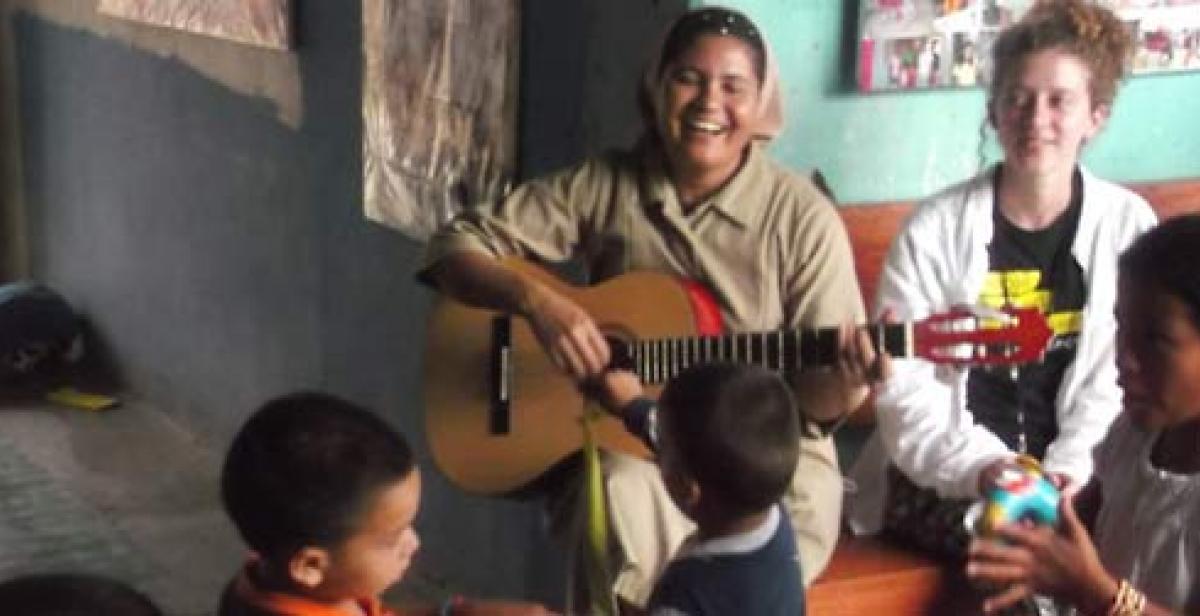It is 5.30 am and the lights are on in the formerly derelict building. The dawn is about to break and Sister Edith Suazo is busy preparing breakfast with ingredients donated from the local community for the children of Fundacion Senor Jose, a children’s home in La Paz, Honduras. The children are woken for school at 6.00 am, “Most do this voluntarily, although some need an extra bit of encouragement to wake to up” Sister Edith tells us. There is then a display of organised chaos as the kids get ready - teeth are brushed, bodies are washed, prayers are said and breakfast is eaten just in time to be ready for school at 7am.
This describes a typical morning at the home, the start of one ordinary day for the kids and Sister Edith. However, the home itself is far from typical and Sister Edith is no ordinary woman. She has completely dedicated her life to the children of the Foundation, a home for for at-risk and abandoned children.
The home is solely run and cared for by Sister Edith, it came into being in 2006 as her personal response to the “extreme poverty and high need (for child services)” she has witnessed in her country. Sister Edith has always loved children and wanted to do more for those in need. She began by looking after two sons of drug addicted mothers when they were no longer able to care for them and had no one else to help.
The home started with next to nothing - they managed to find an abandoned house to live in, that literally had no roof, doors or plumbing when they first moved in. Over the years, with very little help and limited resources, this family has grown from humble origins to having over 17 youngsters between the ages of 2 and 15 and the house has a roof, running water and other necessities. The home relies purely on the charity of the local community and some international support - despite requests it receives no government funding.
The children themselves all come from homes that have severe problems such as abuse, chronic alcoholism, and drug addiction. Sister Edith explains that they have to rebuild themselves “rebuilding is possible to help them overcome their traumas by making them feel secure”. She works hard to give them hope and positivity and to make the children feel happy “I want to make the children as happy as possible for as long as I can, because that is what they need the most”.
When asked about the major challenges, Sister Edith said “the home receives no regular help on a daily basis, so it is very hard to give enough attention to all the children”. She is very thinly stretched on very limited resources, yet despite this it is a very happy home, there is a lot of laughter and what they lack in resources is certainly made up for in love.
We asked Sister Edith what was the best thing about the home, and she responded “the best thing is not what we have, but who the children are, they are the happiness of the house, the happiness they bring and the love they have, they make a happy home out of a hard situation, this is the best thing, like a treasure in my hands”. When asked what the children mean to her, she told us that “they are the most important thing in my life”.
Sister Edith is certainly an extraordinary figure. We spent a day at the home, playing with the children and helping out where we could. The day ended with a birthday celebration with plenty of piñata and cake for all. Sister Edith brought out the guitar and the children all sang along and while we shook some maracas and beat some drums.
Danny, another UK Progressio volunteer noted that one thing that stood out from our time there was the evident “joy and happiness that is shared between Sister Edith and the children”. Sister Edith’s care and affection has created a home that provides support, security, necessities and importantly love for the lost children of La Paz.
Ed Maddocks describes meeting Sister Edith in Honduras.
Photo: Sister Edith and her guitar



